Subjects and verbs must AGREE for example if a subject is singular, the verb must also be singular; if a subject is plural, the verb must also be plural.
EXAMPLES:
- My dog bits my shirt
- The students sing well
- She makes me cry
- He works a lot.
- The boys talk to me.

In the present tense, nouns and verbs form plurals in opposite ways: nouns ADD an s to the singular form; verbs REMOVE the s from the singular form.

These agreement rules do not apply to verbs used in the simple past tense without any helping verbs.

The agreement rules do, however, apply to the following helping verbs when they are used with a main verb: is-are, was-were, has-have, does-do.

The agreement rules do not apply to has-have when used as the SECOND helping verb in a pair.

They do NOT apply to any other helping verbs, such as can, could, shall, should, may, might, will, would, must.

The subject-verb agreement rules apply to all personal pronouns except I and you, which, although SINGULAR, require PLURAL forms of verbs.

MORE INFORMATION
SHORTCUT
THE PARTS OF THE SPEECH
TYPES OF SENTENCES
CONJUNCTIONS
SUBJECT-VERB AGREEMENT
NOUNS
ARTICLES
PRONOUNS
QUANTIFIERS




